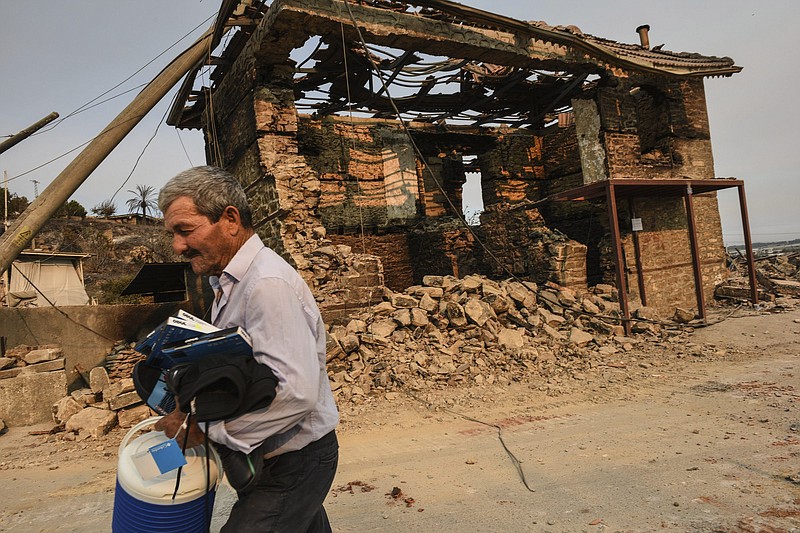ISTANBUL -- Amid a sixth day of raging wildfires in southern Turkey, the European Union and neighboring countries sent planes to assist in bringing the blazes under control Monday, as residents and local officials implored the government to provide more firefighting resources.
The fires, in areas around the southern city of Antalya and parts of Turkey's Turquoise Coast, have killed eight people so far; razed farms and miles of pine forest; and forced evacuations in villages, towns and resorts at the peak of the tourist season.
[Video not showing up above? Click here to watch » https://www.youtube.com/watch?v=4xOhFxVpi8I]
The fires in Turkey come amid a heat wave that has scorched much of southern Europe, with wildfires in Greece and the Italian island of Sicily, along with heat warning in multiple countries. A dome of high pressure above the region has driven the high temperatures, trapping heat that would otherwise rise and dissipate.
Turkish authorities said that over the last week, they had brought more than 100 fires under control, even as new ones broke out Monday.
"Not one of our cries for help since yesterday have been answered. There is still no aerial intervention being made," Muhammet Tokat, a local mayor, said in a video he posted online Monday from a coastal area about 20 miles east of the city of Bodrum. "Please, can our state do what is necessary for a state to do. They must save this land, these people, this community from suffering."
Firefighters have been forced to work in impossible conditions, combating fires in mountainous areas that only airplanes or helicopter can reach. At least two have died.
At the same time, President Recep Tayyip Erdogan's government, which has preached a mantra of Turkish self-sufficiency, has faced intensifying anger after conceding it did not have any of its own fighter fighting aircraft to deploy, leading to complaints it was unprepared for the crisis and its response was delayed.
As the hashtag #helpTurkey trended on Twitter in recent days, government officials bristled at the notion Turkey did not have the resources to help itself.
"Our Turkey is strong. Our state is standing tall," Fahrettin Altun, Erdogan's spokesman wrote on Twitter on Monday, even as an army of firefighters and volunteers struggled to hold the line across a vast area of southern Turkey.
Russia, Ukraine and Azerbaijan have already sent aircraft. Spain and Croatia have also pledged to send planes.
Bekir Pakdemerili, Turkey's minister for Agriculture and Forestry, said Monday that 16 aircraft, along with dozens of helicopters, drones and other equipment had been deployed to fight the fires. But humidity remained unusually low, causing dry conditions that would continue into today at least, he said.
Near the resort city of Marmaris, Sedef Yilmaer, 30, a resident and local hotel owner, was among the volunteers providing water and other supplies to victims of the fire, as other volunteers cut down trees to stop the flames from spreading. Firetrucks could not reach the hilltops and she had only seen a few helicopters dumping water Monday.
"There is not enough," she said in a phone interview Monday afternoon. "There is no government and no management of the crisis."
Meanwhile, Greece was experiencing "the worst heat wave since 1987," Prime Minister Kyriakos Mitsotakis told reporters Monday, referring to a week-long period of warm weather that left more than 1,000 people dead.
Despite the high temperature this week, Mitsotakis advised Greeks to turn down air conditioners and conserve energy to avoid blackouts.
In Italy, some local authorities have said that fires raging across Sicily may have been caused by arsonists. If so, they should get a life sentence, Regional Gov. Nello Musumeci told reporters Saturday.
Information for this article was contributed by Zeynep Karatas of The Washington Post.
